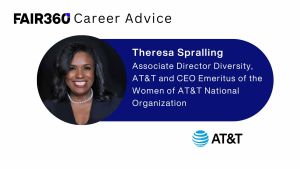In Part 1 of this three-part series, Shawndel Evans, Fair360, formerly DiversityInc’s strategic lead of diversity pipeline management, shares tips on how job applicants can be successful in a COVID-19-affected job market.
The class of 2020 college graduates have entered a job market that has been derailed and become uncertain because of COVID-19. While finding an entry-level job is often stressful, the effects of the global pandemic have shrunken the pool of openings even further. However, it has not necessarily shrunken opportunities for recent grads and entry-level applicants to stand out.

Shawndel Evans, the strategic lead of diversity pipeline management at Fair360, formerly DiversityInc, has spent much of his career working in talent acquisition and recruitment. He says for entry-level candidates, being prepared and using resources like job listing sites and email listservs remain important in getting one’s foot in the door. Above all, networking is key, because many job openings never make it to advertised listings. They are instead filled by contacts made through professional networks. Much of this networking can be done remotely.
Related: Companies Hiring Amid COVID-19 Crisis
“Whether you make contact with a potential employer by responding to a job listing, through networking and involvement in professional associations, or by reaching out to an organization you are interested in, there are many other parts of the employment process — such as creating an effective resume, navigating the job interview and negotiating a salary — where effective strategies can help you land the position that is right for you,” Evans said.
Evans provided further tips on networking and demonstrating skills and value in a corporate world still affected by COVID-19.
Connect with an insider.
Job seekers can connect with insiders at organizations they’re interested through a number of remote means. “Try connecting on LinkedIn, joining a professional organization he or she is a member of, or use your personal network to garner an introduction. Then, continue forging that connection by conveying your passion and the value you can bring to the role,” Evans advises.
Evans stressed the importance of connecting with individuals within companies that job seekers can use as contacts to expand the impression they beyond what’s on paper. “Find someone on the inside of the company and send your information directly to that person — or, depending on the relationship you form, ask that person to vouch for you. It’s a gutsy move (especially if you have no prior connection to that person), but a personal reference almost always results in a higher success rate than relying solely on your cover letter and resume to get you the job,” he said.
Showcase your skills.
It is also important for job seekers to not just “tell,” but also “show” their skills. A portfolio of relevant work provides concrete evidence of credentials listed in cover letters and resumes. Portfolios on paper are useful to bring to interviews, however in-person interviews are becoming less commonplace, and oftentimes the portfolio itself is what will pique employers’ interest enough to bring a candidate in for the interview in the first place.
“Do yourself a favor and build an online portfolio that employers can access immediately when they receive your application materials. Your portfolio then becomes a tool that helps you land the interview, instead of something you showcase at the interview,” Evans said.
Additionally, online portfolios can allow candidates to showcase multimedia work. “Do you have experience developing proposals and securing funding for projects? Include a proposal, timeline, and photos or a time-lapse video of the project in your portfolio,” Evans advised.
Related: 6 Lessons COVID-19 Has Taught Companies About ‘Business as Usual’
Demonstrate your value.
Every individual has unique skills and experiences that could lend themselves to an organization. Don’t be afraid to offer ideas that demonstrate how you would be valuable to the company.
“Think about what the company needs, and develop something unique around that,” Evans said. “For example, you could develop a proposal for a new program, an out-of-the-box marketing tactic, or a grant opportunity. The opportunities are endless — you simply have to use your knowledge of the company and your creativity to develop something relevant and realistic.”
The benefits of offering unique ideas are twofold: One, it shows the candidate has done their research on the company and what it needs, and two, it shows their effort and enthusiasm, “qualities that any sane employer wants in every employee,” Evans said.
















